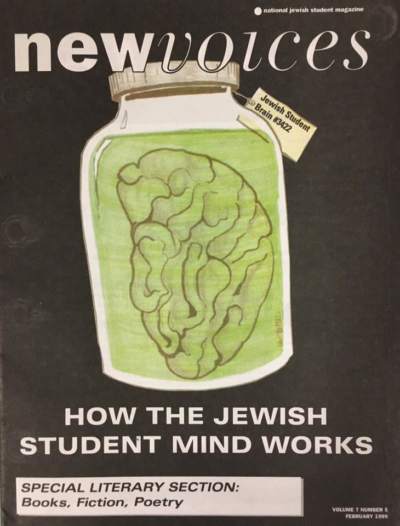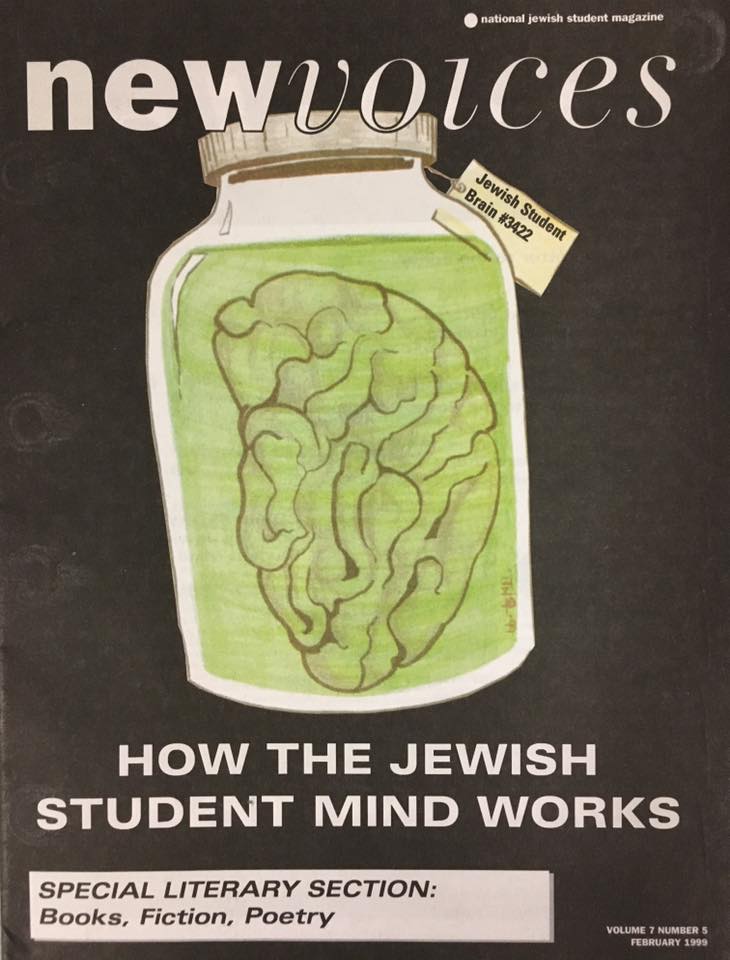Originally published in New Jersey Jewish News.
“What do Jewish millennials want to read?”
“What’s going on in the minds of future Jewry?”
As the editor of New Voices, I field these questions constantly — at conferences, Shabbat tables, blind dates, and board meetings.

Thankfully, New Voices has always had a simple answer. And per Jewish tradition, our answer is actually another question: “What do Jewish millennials want to write?”
Taking the pulse of the next Jewish generation doesn’t require expensive surveys, international trips, or engagement programs. All it takes is giving young people an open platform and the modern version of a megaphone. If you want to know what’s going on in the minds of Jewish millennials, you just have to ask.
That’s my day job at New Voices: asking. I have the privilege of talking to Jewish college students every day about the articles they want to write — the news, questions and issues they consider important enough to shoehorn writing time into their crazy academic schedules.
And the results of those conversations are revealing. Their article ideas are diverse, wonderful, and sometimes weird — and often diverge from the stories you see written about Jewish students by others or the stories written with the hope of garnering millennial readership. Students want to see reporting on their lives beyond new kosher dining halls and dorm-door slurs. Millennials want to dig deeper than the host of youth-geared articles about the latest Jewish thing Lena Dunham said (or insert hip, Jewish celebrity here). We’re the generation of identity politics. We seek out the offbeat stories about how our Jewish identities connect us and divide us, and how they affect the ways we understand other elements of our world like race, politics, and gender.
After almost a year of asking what students want to write, I’ve learned a few major lessons about what they want to read, and about the stories our communities are neglecting to tell about Jewish student life.
Lesson 1: Jewish students don’t exist in a vacuum — or in a separate realm on campus comprised solely of Hillel BBQs and BDS protests.
Jewish students are deeply engaged in broader issues on campus, not to mention the country and the Jewish world, and they want to explore those issues through their own Jewish lens: Is it ethical to silence controversial campus speakers? How can students make their Jewish communities politically and religiously pluralistic? How can they make them LGBT inclusive? Does Jewish identity mean something different under Trump? These are the types of issues writers at New Voices want to tackle.
Lesson 2: Sure, students also want to talk about Israel politics on campus. But they’re discussing those issues differently than Jewish media. Students are delving into the ideologies underlying today’s campus Israel debate, including anti-normalization, triggers, and intersectionality.
By telling simple stories of student brushes with BDS, we miss the meta-story. A movement within the campus left holds that some beliefs, like racism or sexism — or Zionism — are so untenable that they shouldn’t be expressed without counter protest, lest they be considered acceptable or made normal.
Campuses are also embracing the feminist theory of intersectionality, the idea that different identities overlap and all liberation struggles are ultimately connected. For Jewish students, this creates a richer, more complicated Israel debate, which highlights new questions: Can Zionists find a place within the campus left at a time when anti-normalization activists denounce Zionism? Are Zionist or Palestinian displays on campus considered a PTSD hazard for particular students? Are Jewish struggles intersectional? What about Israelis’? Young Jews want to talk about their campus landscapes in all their complexity, using the vocabulary of campus politics to tell more intricate stories.
Ultimately, Jewish millennials are writing — and reading — so much more than the topics typically thought of as “Jewish student issues.” Young Jews want to discuss everything from campus free speech debacles to klezmer punk rock, to Chabad vs. Hillel face-offs, to the state of the union and the perils of Jswipe.
That’s why Jewish student journalism is crucial. You’re thinking, “Really? The Jewish world needs the writing of 18-year-olds?”
Absolutely.
When you give Jewish youth a platform, you give them the opportunity to lead the conversation, to tell you the news they care about in their own words and on their own terms. Jewish student journalism grants the wider community an exclusive peek into the microcosms Jewish millennials navigate, the questions they’re asking themselves, and the frameworks they’re using to talk about Jewish issues. Wondering what the next generation of Jewish activists, thinkers, and leaders will look like? You need look no further than to what they write.
The next time someone asks me what Jewish millennials are reading these days? I’ll just tell them to read New Voices.
Sara Weissman is the editor in chief of New Voices Magazine. Kvetch or kvell to her at editor@newvoices.org.

